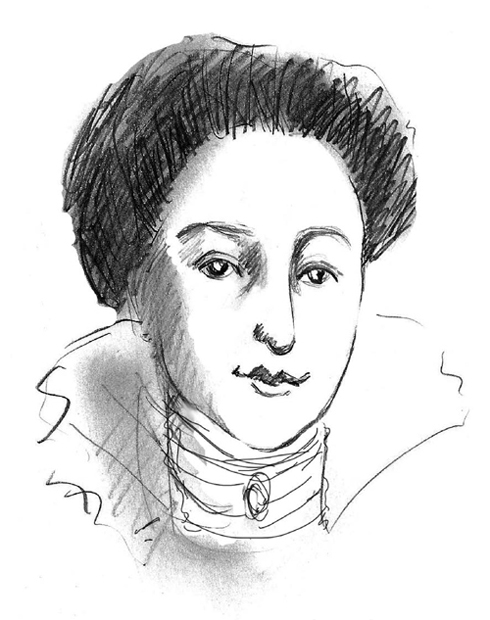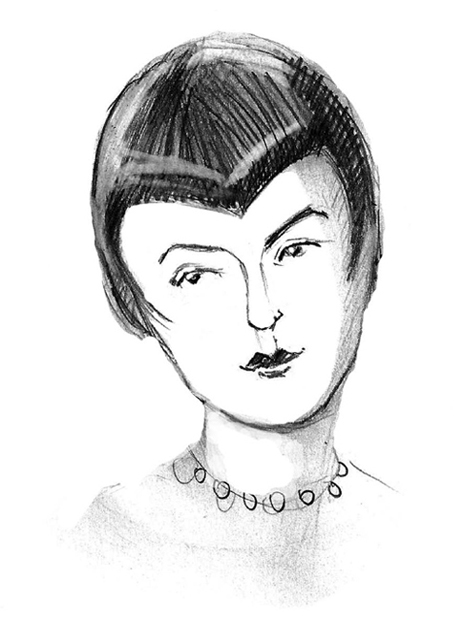Other Women (24 page)
Authors: Fiona McDonald

Rebecca began to tire of having to share her lover with his wife and the other demands on his time. On his side, Wells got insanely jealous at any suggestion that Rebecca might be seeing another man. Rebecca would quarrel with her domestic employees and this made the household constantly unsettled. Wells was so used to the domestic quiet and smooth running of the house he shared with Jane that he kept bringing up the comparison in front of Rebecca. At one point he had Jane send Rebecca a housekeeper, but the woman was so awful that Rebecca told her to leave. Anthony, sticking up for his mother instead of maligning her, suggests that the offer of help from Jane to Rebecca was in fact a veiled insult.
In 1922 Rebecca and Wells met in Gibraltar to begin a holiday in Spain. The reunion was highly anticipated by Rebecca at least and she wrote of how she couldn’t wait to see him. The holiday was a disaster. Wells was ill, or thought he was. His complaints and irritability with everything around him, including his nursemaid, infuriated Rebecca. When she herself had been ill in the past Wells had never had any sympathy or patience with her. Then, to Rebecca’s absolute horror and disgust, Wells ordered her to get his coat from their room before they went out for a walk. It was not a request but a command and it was made in a hotel foyer full of people. Rebecca made an equally public negation to his demand.
What both of them wanted was a caring wife-like figure. Wells already had this in Jane; unfortunately he also wanted sexual excitement and constant stimulation from other sources. Rebecca probably wanted someone to coset her and adore her while letting her follow her career. In other words, the two writers were very similar and therefore totally wrong for each other in any kind of domestic relationship.
Apparently Rebecca, after her mother’s death in 1921, began referring to Wells as her husband when she wrote to him. Over the next seven or eight years the relationship between Wells and West was as tempestuous as ever. They would fight and make up repeatedly. When Jane died of cancer in 1927 Rebecca was worried that she would have to become a Jane substitute and be stifled under the domesticity of looking after a literary genius instead of being one.
Finally the affair ended when Rebecca married Henry Andrews, a respectable banker. This man was to provide the stability and care that she craved for herself. She may have desired the excitement of Wells but when it came to reality, Rebecca West needed financial and emotional support. She settled into middle-class respectability very well and at times bemoaned the fact that she had wasted so much time and energy on loving Wells. The two remained friends until Wells’s death in 1946. Even though Rebecca West had been happily married for nearly twenty years by the time Wells died, she mourned his loss deeply.

HE WOMEN OF
R
ADCLYFFE
H
ALL

Radclyffe Hall
Marguerite Radclyffe-Hall was born on 12 August 1880 of very wealthy, landowning stock. In 1907 she met the woman who would be her first great passion, Mabel Batten, twenty-three years her senior and already a grandmother. Mabel was a very gifted amateur singer and was herself married to an older man. Mabel had had affairs on and off throughout her marriage and if her husband minded he never let it show.
Marguerite, who took the name Radclyffe as a first name, began a steamy affair with Mabel. Again, Mabel’s husband seemed perfectly happy for his wife to amuse herself in this way. On his death Mabel and Radclyffe set up house together. Mabel decided to call her lover John and that was the name that stuck ever afterwards.
Before life with Mabel, John had harboured ambitions to be a writer but had never committed to actually doing it. Under Mabel’s influence and direction, she began to write seriously. It was Mabel who introduced her partner to William Heinemann of the publishing house and on his advice John began writing her first novel. Mabel was always the womanly half of the couple while John had always enjoyed dressing up like a boy and was happy to continue that way. Mabel tended to mother John; after all, she had years of experience and John’s own mother had never been very interested in her daughter.
In 1915 an afternoon tea party was held by Lady Clarendon. John and Mabel were invited as was a much younger cousin of Mabel’s. Her name at birth was Margot Elena Gertrude Taylor, although she preferred Una. Her married name was Troubridge and her title was Lady. Una had a young daughter, Andrea. Admiral Troubridge had three children from his first marriage, had obviously been a bit of a womaniser and gave Una syphilis; it was not a happy union.
At the time of that fateful tea party Mabel and John had been together for eight years. John was prone to falling in love on the spot and had a few flings here and there, but mostly she was dedicated to a life with Mabel, whom she would never leave. Una was introduced to John and it was love at first sight. Mabel was content to let the passion run its usual course and abate. However, this time it didn’t. John and Una saw more and more of each other, sometimes in Mabel’s company but more often than not alone.
By the end of the year the three were on holiday together in Cornwall. Two’s company but three’s a crowd proved true in this case. Mabel complained of tiredness and stayed most of the time in her room reading while the two younger women rambled about by themselves. For Mabel, the holiday was a disaster and she told John that although she didn’t mind her having a younger lover, she did not like being part of a threesome. John was free to see Una but not in Mabel’s company and not all the time. John retorted that Mabel was being overly possessive and jealous, reminding Mabel that she didn’t own her.

Mabel Batten
After a particularly bad quarrel over dinner one night Mabel took a funny turn. At first John thought it was a dramatic tantrum but it soon became apparent that something serious was wrong. Mabel felt terribly cold, had pins and needles in her legs and was getting sharp pains through her chest. She collapsed and was carted off to hospital. Mabel Batten had suffered a cerebral haemorrhage. She slipped in and out of consciousness over the next ten days. She tried to communicate with John but was not able to form words. John was with her when she died.
Filled with remorse and plagued by guilt John refused to see Una. She blamed herself for Mabel’s death, thinking it was the row that had caused it. Una was upset for her own sake, fearing that her new-found love was over before it had begun. After some time they reconciled and Una agreed to accompany John to a spiritual medium to see if they could make contact with Mabel and get advice from her. They were lucky and Mabel’s spirit was able to forgive John and to hand over her welfare to Una.
Grieving for Mabel and contacting her spirit on a regular basis (sometimes up to five times a week) brought John and Una together. Una had never felt anything for Mabel except perhaps resentment but she went along with the game to humour John, whom she was in love with more and more. They made shrines to Mabel in the houses they lived in and put together a long paper to present to the Society for Psychical Research, based on their observations during all the séances they had had for Mabel.
John had become enthralled with the spirit world and was keen to become a member of the council of the Society for Psychical Research. The contents of the paper that she and Una had given had let slip the trio’s sexuality. John Lane Fox-Pitt, an established member of the society, was scandalised that someone of that ilk could be on the council and claimed that the other John was guilty of gross immorality. Fox-Pitt went to Una’s husband to see if he would be backed up if he were to bring a charge against the pair. Admiral Troubridge did feel his wife was losing her grip on reality and that the affair between the two women was disgusting. The charge was made formal and a trial was held. It caused a sensation; the courtroom was packed with spectators anticipating a good show with lots of juicy sex talk.

Una Troubridge
The pair of lovers came dressed in fashionable ladies’ clothes, wearing hats, gloves and all. John had decided, or Una had persuaded her, that appearance would make a huge difference to the outcome of the trial – and they were the stars of the show. But there wasn’t going to be a show after all. Una’s husband in a fit of nerves withdrew his evidence, which left Fox-Pitt standing against the women on his own. In a fast bit of back-pedalling, he too withdrew the accusation and tried to say that he had never made them in the first place. John was awarded £500 damages. How the business came to trial is confusing, as in 1920 lesbianism wasn’t a crime quite simply because it didn’t exist (according to the law). Triumphant, John and Una went back to a quiet life.
Over the next five years the couple settled down into a marriage-type arrangement. The passion of their early love was no longer there but the comfortable domesticity was. John concentrated on writing while Una hovered in the background to help her do it. In 1928 John’s best known work
The Well of Loneliness
, a frank examination of the problems confronting lesbian love, was published by Jonathan Cape. It did not at first cause a scandal. In fact some of the reviews suggested it was rather boring, claiming that was the worst thing about it. And if that had been all that was said about it then the book probably would have disappeared into obscurity.
The
Sunday Express
unexpectedly ran an editorial on it, claiming it was poisonous filth and damaging to public morality. In defence of
The Well of Loneliness
the publishers tried to pull together some big literary names but no one really wanted to be involved. It was not the subject matter so much as the book was not deemed worthy of all the fuss. Virginia Woolf admitted that it put her to sleep, it was so tediously written. Still, fifty-seven writers and critics were ready to testify in the book’s defence but the judge told them that their evidence would not be needed. He had already made up his mind and the book was banned.
It was already in the process of being printed in Paris and it soon hit the bookshops there with a bang. It became an instant bestseller thanks to the judge’s decision. Copies were smuggled into England and John became a writing sensation and women’s hero. It was not actually what she had wanted. John had been serious in trying to express the trouble and pain felt by someone in her position. In many ways she seems to have been a man trapped in a female body, and a conservative one at that. She could not understand the fuss made against the book nor of that made for it – and she didn’t like either.
